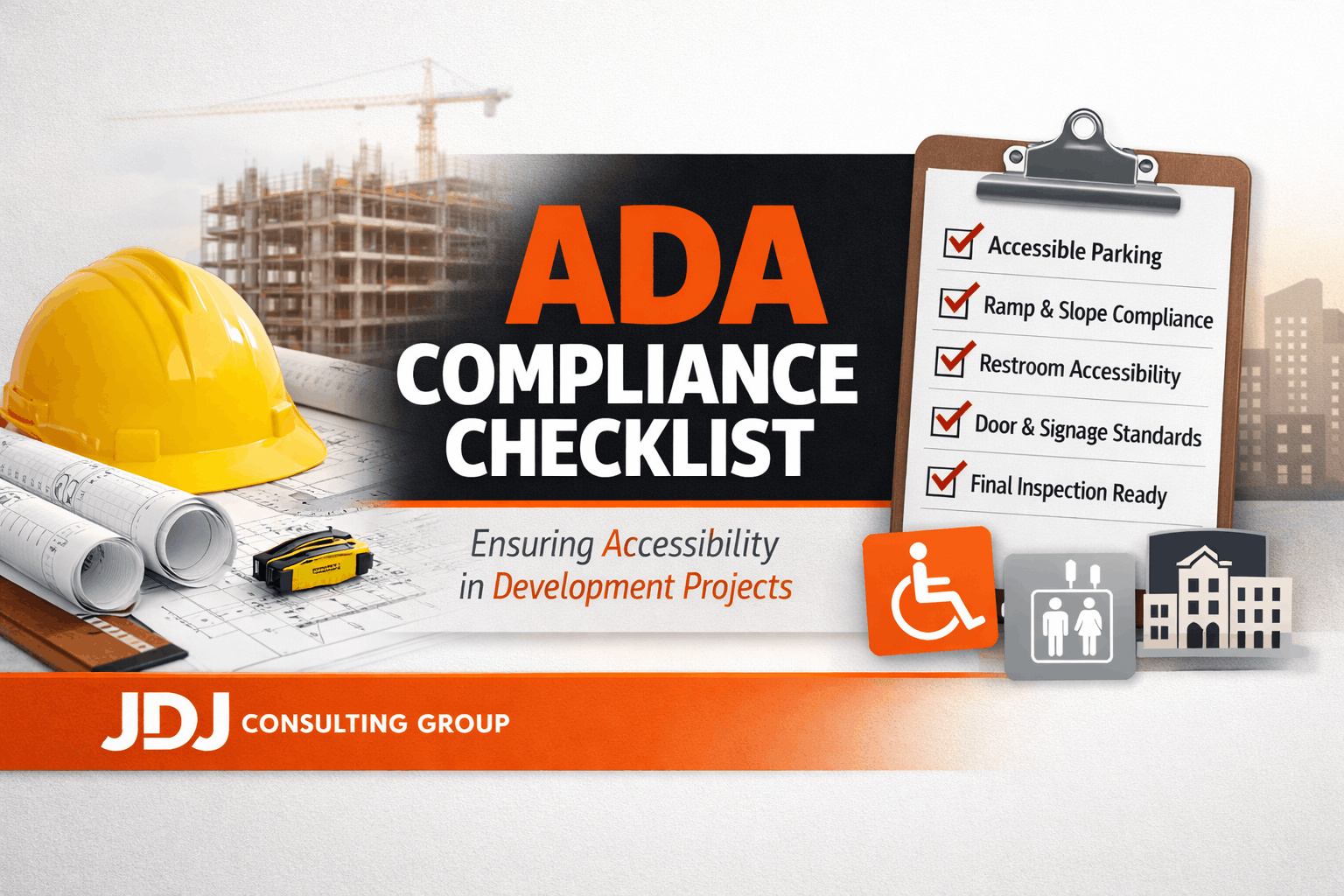Why the Line Between Property and Technology Is Blurring in Los Angeles
Walk into any Los Angeles real estate firm today, and you’ll see a quiet shift happening. The conference tables are still stacked with site plans and zoning maps—but now, there’s a screen at the center showing data dashboards, GIS maps, and AI-driven project models.
Table of Contents
ToggleThis isn’t a coincidence. The real estate world is changing fast, and so is the definition of what a “real estate company” even means. Many firms that once relied on handshakes and paper blueprints are now running like startups—powered by data, digital tools, and internal tech teams.
Let’s explore how this shift is playing out across Los Angeles, and why so many traditional firms are thinking like tech companies—whether they planned to or not.
🚀 JDJ Consulting Group’s CEO Launches the AI in CRE Collective
Exciting news — Jake Heller, CEO of JDJ Consulting Group, has launched the AI in CRE Collective, a forward-thinking initiative connecting leaders at the intersection of technology and commercial real estate.
As real estate continues to evolve, Jake and the JDJ team remain committed to exploring how AI and data-driven tools can redefine the way developers, investors, and consultants plan projects across Los Angeles and beyond.
🔗 Learn More About the Initiative

JDJ Consulting Group • 12925 Riverside Dr Suite 302, Sherman Oaks, CA 91423 • Book a Free Consultation
The Quiet Revolution Inside Real Estate
For years, real estate was a slow-to-change industry. Developers, brokers, and investors leaned on personal networks, local expertise, and decades of experience. But the game has changed.
Digital infrastructure has become just as important as physical infrastructure.
Listing platforms and AI valuation tools are redefining how we assess property value.
City departments are moving permitting and entitlement processes online.
Investors expect real-time reporting and performance analytics.
Technology isn’t an add-on anymore—it’s part of the business model. Firms that once outsourced tech needs are now bringing them in-house, building their own systems, and hiring developers alongside project managers.
In short, real estate companies are starting to behave like tech companies that happen to sell or develop property.

Why It’s Happening Now
Three forces are driving this transformation: pressure, opportunity, and necessity.
1. Market Pressure
Los Angeles is one of the most competitive real estate markets in the world. Every decision—from a feasibility study to an entitlement filing—can cost time and money. Firms are realizing that the only way to stay ahead is through efficiency, and that’s where technology wins.
Automation tools can shave weeks off permitting timelines. AI can help identify underutilized parcels that meet zoning and density goals. Even marketing has become data-driven, using analytics to target specific buyers and investors.
2. Opportunity
Proptech—the intersection of property and technology—has exploded. New platforms can analyze zoning codes, predict rent growth, or model construction costs. These tools aren’t just helpful; they’re strategic assets.
For example:
A developer using GIS-based analytics can pinpoint opportunity zones with lower risk.
An investment group can use predictive data to evaluate neighborhoods before prices spike.
Consultants can track real-time permitting bottlenecks and adjust project timelines accordingly.
Technology has become a competitive advantage. Firms that master it move faster and smarter.
3. Necessity
And finally, the hard truth: you can’t stay analog in a digital city.
Los Angeles’ planning and permitting systems are increasingly online. LADBS, BuildLA, and other portals require digital submission, online coordination, and constant updates.
Even communication with city departments, inspectors, and consultants now happens through automated systems. A firm that refuses to adapt risks delays, lost deals, and frustrated clients.
🏗️ How Real Estate Firms Are Becoming Tech-Driven
Then
- Manual paperwork 📄
- Offline project tracking
- Slow permit coordination
- Data stored in silos
Now
- Digital project management 💻
- Online permit expediting
- AI-powered zoning insights
- Cloud-based collaboration
Source: JDJ Consulting Group internal research, 2025.
The Modern Real Estate Firm: More Data, Less Guesswork
Real estate has always been about location, timing, and relationships. But now there’s a fourth element—data.
Modern firms are tracking more than just square footage and price per foot. They’re analyzing energy use, tenant patterns, neighborhood demographics, and even local permitting wait times.
Here’s what that looks like in practice:
Developers use digital mapping to predict how zoning overlays will impact future value.
Brokers rely on algorithmic matching to pair properties with investor preferences.
Property managers monitor occupancy and maintenance trends through smart building software.
This data doesn’t replace experience—but it refines it. A project manager who once spent hours digging through public records can now access the same insights in seconds.
That’s not a tech trend. That’s operational evolution.
How Technology Is Reshaping Day-to-Day Operations
If you walk through the workflow of a Los Angeles real estate firm today, here’s what you’ll notice:
Digital Permitting
What used to take several trips to the city now happens online. From entitlement submittals to clearances, digital portals have streamlined much of the process—though they’ve also made precision and coordination even more important.
Smart Data Visualization
Many firms now rely on dashboards that pull live data from multiple sources. They use it to forecast construction schedules, compare zoning conditions, or identify patterns across submarkets.
AI and Predictive Tools
Artificial intelligence is helping teams identify project feasibility faster. Some systems can even predict potential setbacks—like clearance delays or utility conflicts—before the first plan check.
Cloud Collaboration
Instead of paper binders and office files, teams are using shared digital ecosystems. Architects, expeditors, and consultants can work simultaneously on the same document, reducing back-and-forth time.
The end result? Projects move faster. Coordination improves. And decision-making becomes grounded in hard data instead of speculation.
The Cultural Shift Behind the Tech
But let’s be clear—this transformation isn’t just about adopting new software. It’s about adopting a new mindset.
Real estate companies that succeed in this new era think differently:
They hire tech talent alongside real estate professionals.
They invest in digital tools as core assets, not optional extras.
They treat data as part of the brand—something that defines how they operate.
This cultural change often starts small. Maybe it’s a brokerage that builds its own CRM instead of using a third-party tool. Or a developer that codes a feasibility model to analyze zoning instantly.
Before long, these internal systems become part of the company’s DNA.
And that’s when a real estate firm starts to look—functionally, operationally, and strategically—like a tech company.
Where Los Angeles Leads the Way
Los Angeles is uniquely positioned to lead this shift. Why? Because it’s both a tech city and a real estate powerhouse.
The region is home to thousands of developers, investors, and design professionals—but it’s also a growing hub for proptech startups and venture-backed innovation. The overlap between these industries is widening fast.
We’re seeing:
Real estate investment firms partnering with data analytics startups.
Architecture and planning firms integrating AI zoning tools.
Developers using VR for virtual walk-throughs before groundbreaking.
This hybrid ecosystem—where tech and property teams collaborate—is giving LA firms a serious edge. They’re not waiting for innovation to happen. They’re creating it.

Is Every Real Estate Company a Tech Company Now?
That’s the big question, isn’t it?
Some might say this trend is overhyped. After all, buildings are still physical, not digital. You can’t “code” a concrete pour.
But that misses the point.
Being a tech company doesn’t mean replacing physical work with digital tools—it means using technology as a strategic foundation for growth.
A few ways that’s already true:
Every marketing plan now depends on digital analytics.
Every permit submission now passes through an online portal.
Every investor expects performance data on demand.
So yes—while most real estate companies still focus on property, their core operations increasingly resemble tech firms. They gather data, run models, test assumptions, and optimize workflows.
That’s not hype. That’s reality.
The Risks of Ignoring the Shift
Of course, not every firm is adapting. Some are resisting the change—often because they see tech as a cost rather than an investment.
That’s risky.
Firms that fail to evolve face real challenges:
Longer timelines due to manual processes
Weaker communication across teams
Slower market insights compared to data-driven competitors
Reduced investor confidence, especially from institutional backers expecting transparency
The industry is moving toward automation and integration. Those who lag behind may find themselves outpaced not just by competitors, but by the systems they once relied on.
A More Integrated Future
The next phase of this evolution won’t just be about adopting software—it’ll be about integration.
Imagine:
Permitting platforms that sync directly with project schedules.
Data tools that pull zoning, infrastructure, and community input into a single interface.
Real-time collaboration between developers, consultants, and city officials through shared systems.
That’s not a fantasy. It’s already starting to happen in Los Angeles. And firms that understand this shift—those that see technology not as a replacement but as a partner—will define the next era of real estate.
Final Thoughts: Real Estate’s New Identity
So, are real estate companies turning into tech companies? In many ways, yes.
They’re still buying, building, and managing property—but how they operate has changed forever. The firms that succeed in the next decade will be the ones that think digitally, plan efficiently, and invest in innovation as seriously as they invest in land.
At JDJ Consulting Group, we’ve seen this transition up close. The future of real estate isn’t just about bricks and zoning maps—it’s about systems, data, and strategy.
And for Los Angeles firms ready to embrace that mindset, the opportunities are endless.
Article courtesy: Reddit discussion
⚙️ Is Your Real Estate Business Tech-Ready?
Answer a few quick questions to see where you stand:
- Do you track permits and entitlements digitally?
- Are your project teams collaborating online?
- Do you use data analytics for development decisions?
- Is your workflow still dependent on paper approvals?
If you answered “No” to two or more — it’s time to modernize!
📞 Talk to JDJ Consulting GroupLooking to make your real estate business more efficient, modern, and tech-driven?
At JDJ Consulting Group, we love helping developers, investors, and property owners bring smarter systems and strategy into their projects. From entitlement consulting and zoning analysis to development planning and process optimization, our team is here to simplify the complex and help your vision move forward.
Let’s talk about what you’re building and how we can make it easier.
📞 Call us: (818) 793-5058
✉️ Email: sales@jdj-consulting.com
📍 Visit: 12925 Riverside Dr Suite 302, Sherman Oaks, CA 91423
💬 Book your free consultation: jdj-consulting.com/book-consultation/
🔗 Learn more about what we do: jdj-consulting.com/services/






